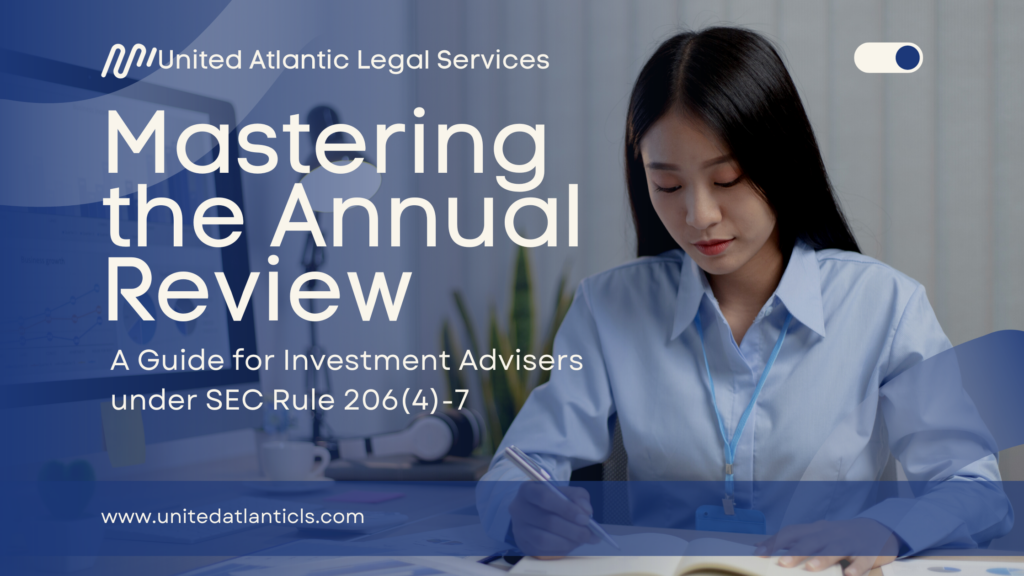As we are now well into the fourth quarter of 2024, United Atlantic Legal Services wanted to give our colleagues a few tips and for conducting an annual review under SEC Rule 206(4)-7.

Mastering the Annual Review: A Guide for Investment Advisers under SEC Rule 206(4)-7
In the intricate landscape of investment advisory, compliance is not just a requirement; it’s the bedrock of investor trust and regulatory integrity. For registered investment advisers (RIAs), an annual review is more than a regulatory box to check—it’s an opportunity to strengthen processes, enhance transparency, and demonstrate a commitment to excellence. Let’s delve into some insightful tips on how to conduct a thorough annual review under SEC Rule 206(4)-7.
Understanding SEC Rule 206(4)-7
Before we embark on the tips, let’s briefly outline the essence of SEC Rule 206(4)-7. This rule requires RIAs to adopt and implement written policies and procedures reasonably designed to prevent violations of the Investment Advisers Act. Furthermore, advisers must conduct an annual review to determine the effectiveness of these policies and procedures.
Tips for a Comprehensive Annual Review:
1. Review Written Policies and Procedures:
- Begin with a meticulous examination of your written policies and procedures. Ensure they are up-to-date, relevant, and in alignment with the regulatory landscape. Any changes in the business environment or regulations should be reflected in these documents.
2. Risk Assessment:
- Conduct a thorough risk assessment of your advisory business. Identify and evaluate potential risks associated with your operations, investment strategies, and compliance processes. This step is crucial for tailoring your review to the specific challenges and nuances of your practice.
3. Comprehensive Testing:
- Don’t just rely on theoretical assessments. Implement comprehensive testing of your policies and procedures. This may involve sample testing, scenario analysis, and a deep dive into historical data to ensure that your compliance framework stands up to real-world scrutiny.
4. Independence in the Review Process:
- Ensure that the individuals conducting the annual review possess the necessary independence and objectivity. An independent review is more likely to identify potential issues and gaps that may go unnoticed in a more biased assessment.
5. Documentation is Key:
- Thoroughly document the entire review process. This includes the scope of the review, the methodologies employed, findings, and any corrective actions taken. Well-documented reviews not only demonstrate regulatory compliance but also serve as valuable references for future assessments.
6. Employee Training and Awareness:
- Use the annual review as an opportunity to reinforce employee training and awareness. Ensure that your team is well-versed in the latest compliance requirements, potential risks, and the firm’s policies and procedures. An informed team is your first line of defense against compliance lapses.
7. Address Identified Deficiencies Promptly:
- If the review reveals deficiencies or areas for improvement, address them promptly. Develop and implement corrective actions to mitigate risks and enhance the effectiveness of your compliance framework.
8. Engage with Legal and Compliance Experts:
- Consider engaging legal and compliance experts to provide an external perspective on your policies and procedures. Their insights can offer valuable perspectives and ensure that your compliance framework aligns with industry best practices and evolving regulatory standards.
9. Stay Informed:
- Regulatory landscapes evolve. Stay informed about changes in regulations and industry best practices. Regularly update your policies and procedures to reflect these changes and ensure ongoing compliance.
10. Demonstrate a Culture of Compliance:
- Beyond meeting regulatory requirements, use the annual review to foster a culture of compliance within your organization. Encourage open communication, ethical conduct, and a shared commitment to regulatory integrity.
In conclusion, an annual review under SEC Rule 206(4)-7 is not just a compliance obligation—it’s an invaluable tool for fortifying your advisory practice. By approaching the annual review with diligence, independence, and a commitment to continuous improvement, you not only fulfill regulatory requirements but also instill confidence in investors and contribute to the long-term success of your firm.
About the Author

Michael Rasmussen is the founder of United Atlantic Legal Services. He is a licensed attorney in Florida and registered solicitor in the United Kingdom. Michael has acted as General Counsel and Chief Compliance Officer to several investment advisers, including private fund managers, responsible for the management of billions of dollars in client assets.
Michael is also the founder of FinProLaw, an online learning platform where Michael has created courses designed for investment adviser compliance professionals. These courses include:
- Investment Adviser Compliance Essential for Chief Compliance Officers
- Foundations of Investment Adviser Compliance
- What is a “Security”?
- Investment Adviser Marketing Rule
- Regulation A – Exemption from Registration
- Regulation Crowdfunding – Exemption from Registration
- Regulation D – Exemption from Registration
Michael can also be found on LinkedIn.
Investment adviser firms who are also clients of United Atlantic Legal Services can receive many of these courses at a significantly reduced fee or, in some cases, at no expense. Contact us today or visit the FinProLaw to learn more.